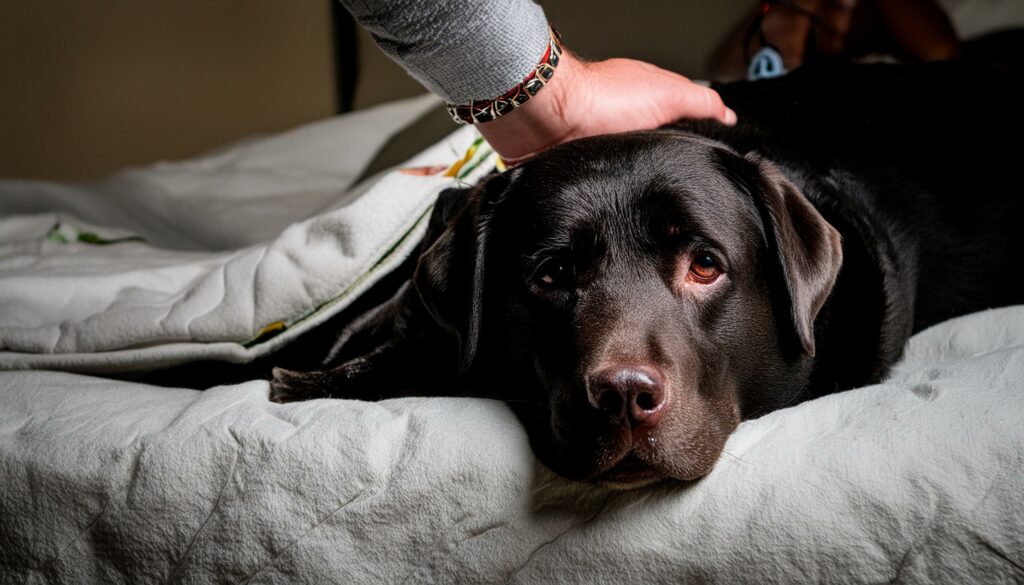Sharing your bed with a pet, such as a Labrador, is a topic of delightful consideration for many pet owners. The idea of cuddling up with your furry best friend at the end of a long day might seem comforting, but it’s essential to delve into whether it’s beneficial or practical. This article explores the emotional and physical aspects of sharing your sleeping space with a Labrador, examining both the benefits and the necessary considerations.
Benefits

Emotional Bonding
One of the most significant advantages of sleeping with your Labrador is the enhancement of the emotional bond between pet and owner.
This shared experience can increase feelings of companionship and affection. Nighttime is often a quiet, serene time where daily distractions are at a minimum, allowing for peaceful moments with your dog that strengthen your bond.
Health Benefits
Numerous studies suggest that there are tangible health benefits to sleeping with a pet. For instance, the presence of a Labrador can reduce stress and anxiety, contributing to a calming environment that may help lower blood pressure and improve overall heart health. The rhythmic breathing and warm presence of a dog can also aid in reducing insomnia and improving sleep quality.
Safety and Comfort
For those who live alone or in remote areas, a dog can provide an added sense of security. Labradors, known for their loyalty and protective nature, can make you feel safer and less isolated. This feeling of security can help alleviate night-time anxieties and provide comfort, leading to a more restful sleep.
Considerations
Size of the Labrador
Labradors are medium to large dogs, and their size can be a crucial factor to consider before allowing them into your bed. They require sufficient space to lie down comfortably, and sharing a bed with a Labrador might be impractical in a smaller bed or for larger breeds.
Hygiene
Hygiene is a critical consideration when sharing your bed with any pet. Labradors need regular grooming to keep their fur, paws, and overall body clean. Ensuring that your Labrador is well-groomed and clean before they hop into bed is essential to maintain a hygienic sleeping environment.
Sleep Interruptions
Labradors can disrupt your sleep in several ways. They may adjust their position during the night, snore, or even dream loudly. For light sleepers, these disturbances can interrupt sleep and lead to a decrease in sleep quality.
Preparing Your Bed

Bed Size and Setup
Choosing the right size bed is essential if you plan to sleep with your Labrador. Ideally, a king-sized bed would give both you and your pet ample space. Additionally, your bedding should be durable and easy to clean, as pets can be messy.
Training Your Labrador
It’s vital to train your Labrador to understand the rules about sleeping in your bed. Training them to lie down quietly, stay on their own side, and avoid jumping up and down from the bed excessively will help maintain a stable sleeping environment.
Potential Risks
Allergies
Sleeping with a Labrador can exacerbate allergies. Dog dander, hair, and outdoor allergens carried on their fur can trigger allergic reactions, which may lead to respiratory issues or skin irritations for sensitive individuals.
Dominance and Behavior Issues
Allowing a dog into your bed can occasionally lead to dominance issues. Some dogs might perceive being allowed on the bed as a hierarchy shift, potentially leading to behavioral issues elsewhere in the home. Maintaining clear boundaries and consistent training practices is crucial.
Case Studies
Several Labrador owners have shared positive experiences regarding sleeping with their dogs. They report benefits such as reduced anxiety, increased security, and enhanced bonds with their pets. However, adjustments regarding bed size and personal sleep habits were often necessary to accommodate their Labradors comfortably.
Conclusion
The decision to share your bed with a Labrador involves a balance of emotional benefits and practical considerations. It can lead to enhanced emotional bonds and potential health benefits but requires careful consideration of hygiene, space, and personal health. For those who choose to sleep with their Labradors, setting clear rules and maintaining proper hygiene can mitigate most risks.
FAQs
Is it safe to let a puppy Labrador sleep in my bed?
Allowing a puppy in your bed can start a habit that might be hard to break later on. It’s generally safer to train puppies to sleep in their own space to avoid accidents and establish boundaries early.
What should I do if my Labrador starts to show signs of aggression when in my bed?
If your Labrador shows signs of aggression, it’s important to reassess their sleeping arrangements. Consulting a pet behaviorist can also provide strategies to address and correct this behavior.
How often should I bathe my Labrador if it sleeps in my bed?
If your Labrador sleeps in your bed, bathing every 2-4 weeks is advisable, along with regular paw cleaning and grooming to maintain bed hygiene.
Are there specific breeds of dogs that should not be allowed in bed?
Breeds with significant health issues, especially those prone to joint problems like Dachshunds or very large breeds like Great Danes, might be better off sleeping in their own beds to avoid injuries.
Can sleeping with my Labrador affect its training or behavior outside the bedroom?
Yes, allowing a dog into your bed can sometimes blur boundaries and affect training. Consistency in all areas of training is crucial to prevent behavioral issues.
